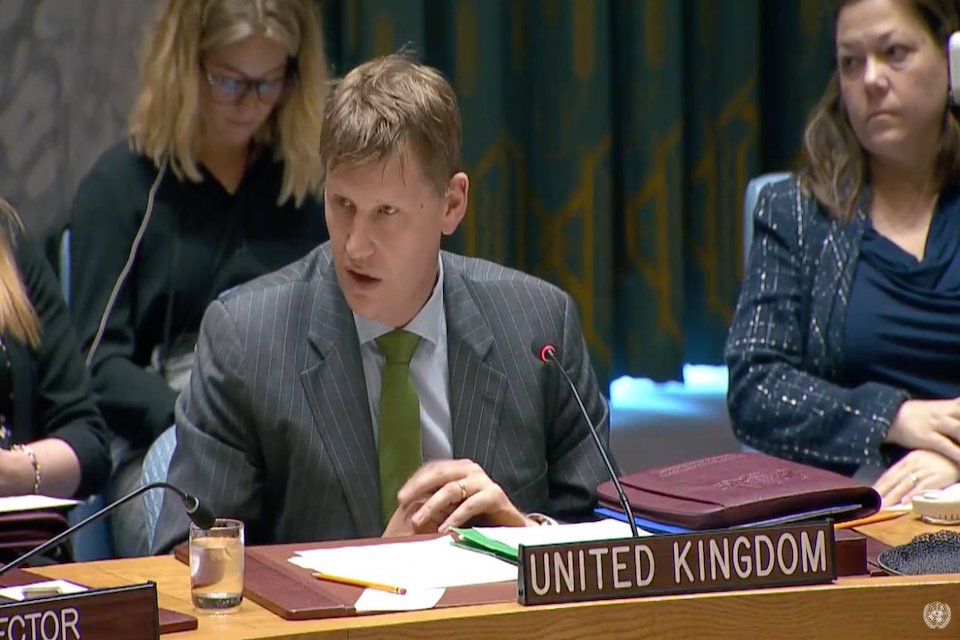Progress since the transition to a new government in Sudan
Statement by Ambassador Jonathan Allen, UK Deputy Permanent Representative to the UN, at the Security Council briefing on Sudan.

Thank you, Mr President. Thank you Under-Secretary Lacroix for your briefing and I may I also welcome the Ambassador of Sudan here.
Under-Secretary Lacroix, you talked about some of the remarkable changes that have happened since this council last met on Sudan. And I would add one of those, which was the sight and the opportunity to hear Prime Minister Hamdok during the General Assembly’s High-Level Week. And I think he made a huge impression on all of those of us who met him, who listened to what he had to say, and if you ever wanted a better illustration of the change that has taken place in Sudan over the last few months, it was that for me. And I again congratulate and salute the people of Sudan for the courage they’ve shown in choosing the path that they are now on. It’s not going to be, I’m sure, always a straightforward path, but we and others are there in their support.
Mr. President, we continue to see, as Under-Secretary-General Lacroix has set out positive developments in Sudan as the civilian government takes forward implementation of the constitutional declaration. Like him, I would like to welcome the appointment of women to key positions within the new government and also the milestone agreement to open an office of the High Commissioner for Human Rights in Sudan.
But as we were enjoined, we must all support unequivocally the new momentum behind they peace talks; they were Under-Secretary-General Lacroix’s words. And I think from the UK’s perspective, the start of those peace talks between the government and the UN movements, the work done in Juba is of particular importance. And we therefore encourage all sides – in particular, the armed movements – to engage constructively, immediately and without preconditions so that a comprehensive, fair and inclusive peace agreement can finally be achieved.
I would also like to say how much we welcome the decision to remove bureaucratic impediments imposed on humanitarian actors and hope this decision will be implemented fully to enable much needed unfettered humanitarian access throughout Darfur and wherever it is needed in Sudan.
Turning to the situation on the ground, notwithstanding the positive developments that we’ve learned about today, we cannot ignore the fact that the security, humanitarian and human rights situation in Darfur remains volatile. We remain concerned by the gaps that Jean-Pierre mentioned: the increase in inter-communal conflict and criminality and continued civilian displacement and human rights violations and abuses, all of which are documented in the report to the Secretary-General and AU chairperson. The Council, the United Nations, the African Union but most critically of all, the government of Sudan will need to seriously consider how to address these continued challenges in order to prevent them from undermining the transition to peace building.
Now, turning to the mandate of UNAMID, let me first say, Mr President, that the United Kingdom remains absolutely committed to ensuring a transition from peacekeeping to peace building and that it is successful and responsible. And we are, as I’ve set out already, extremely optimistic about that and about the opportunities presented by the new civilian government and the prospects for a comprehensive peace agreement in not only Darfur, but also other areas.
It is a complex situation. The root causes remain unresolved and I think we will take into consultations, Mr President, to have more detailed conversations on UNAMID’s mandate. But let me just say here that the United Kingdom will be guided by the emphasis that the government of Sudan has made about the importance of not creating a vacuum, a security vacuum during the ongoing peace efforts – and I noted the communique of the African Union in that context. And we certainly believe that withdrawing UNAMID at this critical time would create such a vacuum and remove a key part of international support to the peace process.
On the follow-on side that Under-Secretary-General Lacroix also touched on, I think it is really important, as he said, the priorities for the follow-on are aligned with those of the government. And we think it’s important to ensure ongoing support to Darfur and we will want to give the government time to consider the options that it wants for future international support and cooperation.
Let me finish then, Mr President, by simply welcoming the commitment I think we all have – the UK certainly has, the United Nations and the African Union – to engage actively with the government in Sudan in the coming months on options for a follow-on presence. We look forward to receiving them – I think you’ve said in December – and to making progress on that transition, making that transition from peacekeeping to peace building, and all of our support I think with the people and government Sudan at this time.
Thank you, Mr President.